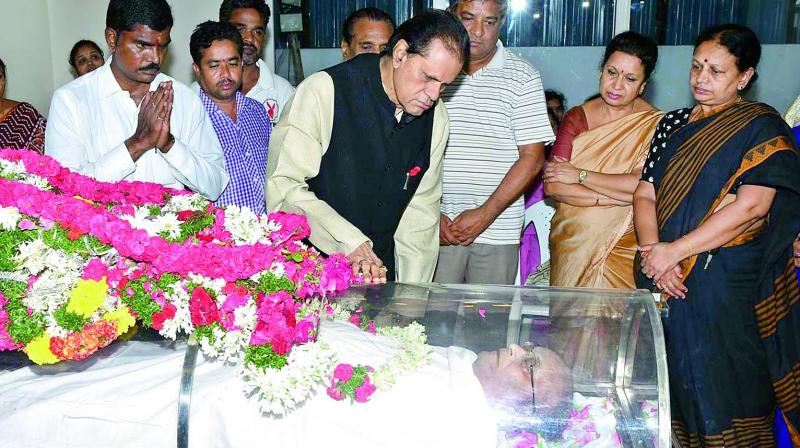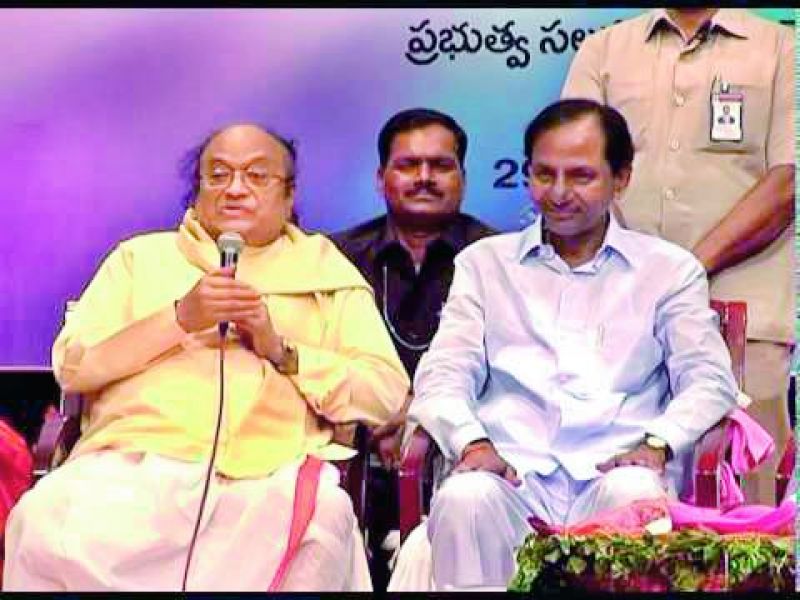Cinare: Lyrics in his blood
CNR had proved his mettle in poetic, film, academic, literary fields.

Hyderabad: Dr C. Narayana Reddy, one of the most renowned poet-writer of his generation who died early on Monday, loved rivers and penned a Geya Kavyam, “Nagarjuna Sagaram”, on the world’s largest masonary dam built across the river Krishna. He named his four daughters after rivers—Ganga, Yamuna, Saraswathi and Krishnaveni.
In one of his famous ghazals, Cinare wrote, “Dhana sampattiki lotee raadu, Jala vidyuthuku koratee raadu, avasaraaniki meeta nokkitee velagani bulubu denikani (there is no dearth of funds, there is abundant hydel energy, but there is still no power when you switch on the light).
He was one of the disciples of Kavi Samrat Viswanadha Satya-narayana, himself a recipient of the Jnanpith award.
Cinare instituted an award named after his wife Susheela and used to present the award to a women writer every year. He was chairman of the AP Official Language Commission, Vice-Chancellor of the Andhra Pradesh Open University, Vice-Chancellor of the Telugu University. adviser to the AP government on culture and language and chairman, Andhra Pradesh State Cultural Council.
At the time of his passing, Cinare was president, Andhra Saraswatha Parishath, a prestigious literary organisation established in 1943.
Interestingly, Cinera’s middle school education was entirely in Urdu medium due to lack of Telugu medium schools during the Nizam rule. He studied Telugu in private schools and colleges later on. From the Urdu language he picked up the literary form of ghazal, that has rhyming couplets.
Starting his poetic career with a slender volume of lyrics, Navvani Puvvu (The Bashful Flower) in 1953, the poet in Narayana Reddy soon blossomed into the tender smiles of the middle class with Madhyataragati Mandahasam (1968) witnessing on one hand the cycle of seasons in his Ritu Chakram (1964) and the wild laughter of the leaping flames surrounding man in his Mantalu Manavudu (1970) on the other and finally emerged with a universal vision of man in his epic poem Viswambhara (1980). His work was noted for its fine blend of lyrical romanticism, optimistic humanism, progressive idealism and healthy realism.
While working in Osmania University as a lecturer, Dr Narayana Reddy caught the attention of N.T. Rama Rao, who was already famous. Cinare was invited to Madras in the later part of 1961 and offered the chance to write songs for the NTR production Gulebakavali Katha.
Dr Narayana Reddy laid down the condition that he would write all the songs — called a ‘single card entry’ in trade parlance, meaning that only his name would appear as song writer in the film’s credits.
NTR agreed, and Dr Narayana Reddy entered Telugu films with the movie which became a blockbuster hit in 1962. His first song, ‘Nannu Dochukunduvate Vannela Dorasani’, is popular even now.
Though he used to maintain cordial relations with all political and film personalities, he had a special relationship with NTR. When asked by NTR, Cinare used to make a special effort to write songs with long phrases that were with full of adjectives in Sanskrit in movies like Srikrishna Pandaveeyam and Dana Veera Soora Karna.
When NTR was producing Talla-Pellama at a time the first separate Telangana agitation was at its peak in 1969, he insisted that Dr Narayana Reddy write a song laying stress on importance of the state being undivided.
Cinare penned 'Telugujaathi manadi, Ninduga velugu jaathi manadi. It drew a lot of criticism in the Telangana region, and there were attacks on NTR's properties in Hyderabad at that time.
Cinare also wrote a song for the Hindi version of Brahmarshi Viswamitra, at the request of NTR and music director Ravindra Jain.
Cinare was not interested in writing dialogues for films. But, when NTR insisted, he wrote the dialogues for Yeka Veera and Akbar Salim Anarkali - both of which flopped at the box office.
Cinare once said, "N.T. Rama Rao garu developed a special interest for the dialogues of Prithviraj Kapoor in Mughal-e-Azam and wanted me to write similar dialogues for the Akbar Salim Anarkali. I told him it would not suit Telugu films as there would be a major change in line in Kartha Karma and Kriya, but he insisted and I did it. The audience did not receive it well though Rama Rao garu was satisfied with my work."
Last public appearance
Dr C. Narayana Reddy, former Tamil Nadu Governor K. Rosaiah and the famous actor late Akkineni Nageswara Rao had shared the dias in hundreds of meetings at Ravindra Bharathi and elsewhere over the last 50 years.
Among the three, the audiences used to wait for Cinare, for his inimitable style and ready poetry.
His last public appearance was on June 7 this year, when he attended a meeting of the Telangana Saraswatha Parishad despite his failing health.
He only spoke one sentence saying Mr K.V. Ramanachary (adviser to the state government) would preside over the meeting and Mr Nandini Siddareddy (chairman, Telangana Sahitya Academy) would release the book, and left.
CNR’s work got KCR his first win
Telangana state Chief Minister K. Chandrasekhar Rao had an experience with Narayana Reddy indirectly. He narrated this when he sat with Dr Reddy at a literary meet at Ravindra Bharathi two years ago.
Mr Rao said there was a competition in Telugu literary skills at Siddipet High School where he was a student. He did not prepare himself for the competition, and there was only a day left. Mr Rao came to Sultan Bazaar here, and searched for books on the famous ‘Book Street’ and finally picked up Cinare's ‘Mandara Makarandalu’.
It was a booklet that contained the original poems of the great poet Pothana's Maha Bhagavatam and Dr Narayana Reddy’s transalation with comments explaining the literary skills of Pothana. Mr Rao said he learnt the whole booklet in the night preceding the competition and stood first.
Golden hits
- Telugu jaathi manadi, ninduga velugu jaathi manadi (Talla-Pellamaa)
- Krishnaveni teluginti viribhoni (Krishna veni)
- Chitram bhalare vichitram (Dana Veera Sura Karna)
- Vagala raanivi neeve, sogasukadanu neene (Bandipotu)
- Gaaliki Kulamedi (Maharathi Karna)
- Vastaadu naa raju ee roju (Alluri Sitaramaraju)
- Ee nallani rallalo, ye kannulu dageno (Amarasilpi Jakkanna)
- Ninna leni andamedo, niduralechenenduko (Puja Phalam)
- Pagale vennela jagame ooyala (Puja Phalam)
- Anubandham atmeeyatha anta oka butakam (Thata Manavadu)
- Telisindile telisindile nelaraaja neeroopu telisindile (Ramudu-Bheemudu)
- Oh mutyala bomma (Ose Ramulamma)


